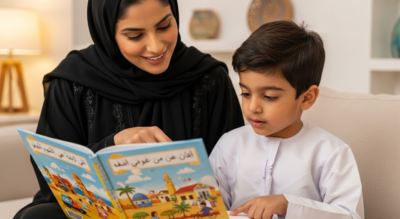ARTICLE AD BOX

Abu Dhabi to mandate 4 hours of Arabic weekly for KG students to boost early fluency and cultural identity
Abu Dhabi’s Department of Education and Knowledge (ADEK) has announced a landmark policy requiring all private and educational partnership schools to dedicate four hours (240 minutes) per week to Arabic language instruction for children in early childhood education, starting from the 2025–2026 academic year. The mandate applies to all early years levels, from nursery (pre-KG) to KG2 (second year), and will increase to five hours weekly (300 minutes) starting in 2026–2027, ADEK confirmed.
Language as identity: The intent behind the policy
While the directive enforces instructional time, ADEK emphasises that the goal goes far beyond curriculum metrics. “This is about more than just adding Arabic lessons,” said Mariam Al Hallami, Executive Director of Early Education at ADEK.“It’s about giving every child in Abu Dhabi the gift of language, identity, and connection starting from day one. We want Arabic to feel natural, interactive and alive in every classroom and every home,” she added. The policy’s timing is deliberate: backed by research showing that early childhood is the most effective period for language acquisition, the strategy aims to root Arabic as a living, thriving language in children’s daily lives, both at school and at home.
ADEK highlighted that although Arabic is commonly spoken at home in Abu Dhabi, many children still lack the confidence to use it fluently. The initiative is designed to close that gap by ensuring consistent, quality instruction through immersive methods and active family engagement.
Dual track learning: Native and non-native speakers
To meet diverse classroom needs, the program will follow two dedicated learning tracks:
- One for native Arabic speakers to deepen their fluency and mastery
- Another for non-native speakers and newcomers to develop strong foundational language skills
The instruction will be delivered through interactive, age-appropriate techniques, including:
- Play-based learning
- Storytelling
- Music and songs
- Hands-on exploration
To ensure quality, schools will employ specially trained teachers and use modern learning resources.
Schools are also encouraged to build strong school-home connections, sharing tools and activities to keep children engaged with Arabic even outside the classroom.
Bridging policy gaps in early education
The initiative aligns with ADEK’s broader goals to harmonise Arabic instruction between nurseries, currently regulated under its Early Education Institutions (EEI) policies, and Cycle 1 education, which is governed by the Ministry of Education. By standardising Arabic exposure across all early education providers, Abu Dhabi is aiming to build language skills, foster cultural belonging, and ensure that children are well-prepared as they transition to formal schooling.
A nationwide push to prioritise Arabic
Abu Dhabi’s new policy is part of a wider national effort to revitalise Arabic language learning from birth to school age, with similar actions now being taken in other emirates:
- In Dubai, the Knowledge and Human Development Authority (KHDA) rolled out a policy in February 2025 requiring Arabic instruction for all children from birth to age six in private schools and early childhood centres.
- In Sharjah, Sheikh Dr Sultan bin Muhammad Al Qasimi, Supreme Council Member and Ruler of Sharjah, decreed in November 2024 that Arabic become the medium of instruction in all government nurseries. He also stressed early education’s role in supporting children’s development, nutrition, and wellbeing.
This bold move by Abu Dhabi reflects a strategic cultural investment: reinforcing Arabic not just as a language subject, but as a core identity marker for the next generation, native and non-native speakers alike.



.png)
.png)
.png)
















 3 hours ago
5
3 hours ago
5









 English (US) ·
English (US) ·